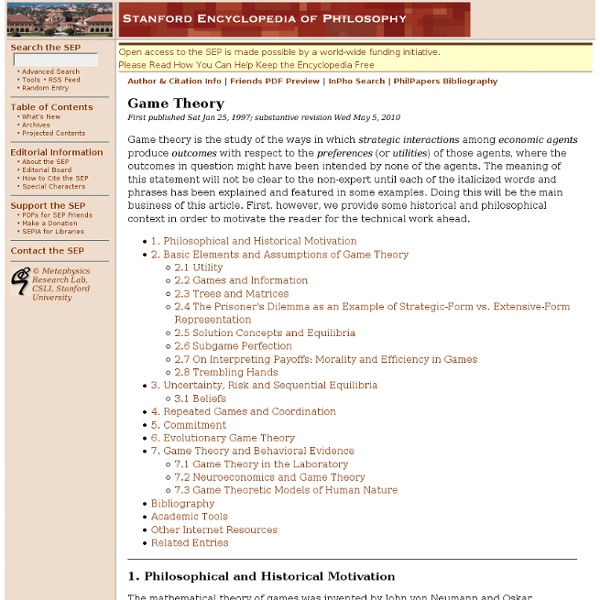Symbolic Logic
Symbolic logic is the method of representing logical expressions through the use of symbols and variables, rather than in ordinary language. This has the benefit of removing the ambiguity that normally accompanies ordinary languages, such as English, and allows easier operation. There are many systems of symbolic logic, such as classical propositional logic, first-order logic and modal logic.
Interpretations of quantum mechanics
An interpretation of quantum mechanics is a set of statements which attempt to explain how quantum mechanics informs our understanding of nature. Although quantum mechanics has held up to rigorous and thorough experimental testing, many of these experiments are open to different interpretations. There exist a number of contending schools of thought, differing over whether quantum mechanics can be understood to be deterministic, which elements of quantum mechanics can be considered "real", and other matters. This question is of special interest to philosophers of physics, as physicists continue to show a strong interest in the subject.
6 Things the Film Industry Doesn’t Want You to Know About
All this week, Film School Rejects presents a daily dose of our favorite articles from the archive. Originally published in September 2011, Ashe Cantrell pulls back the curtain on the Hollywood conspiracy machine… You may already be a film industry cynic. Maybe you think Hollywood is a barren wasteland, devoid of creativity and originality. Maybe you’re sick of seeing talented people get ignored and vapid hacks get splashed all over the trades. Maybe you’re tired of 3D everything and having to re-buy your movies every five to ten years.
Immanuel Kant
Immanuel Kant (1724–1804) is one of the greatest figures in philosophy. Kant was a professor of philosophy and sciences, and eventually logic and metaphysics at the University of Königsberg. Kant called his insights on knowledge “the Copernican revolution in philosophy” (comparing his impact on philosophy to Copernicus’ impact on astronomy). He believed that ideas can have truth independant of reality outside of our minds, that reality is known only when it conforms to the mind that holds its knowledge.
Create paintings from photos
Did you ever wanted to be a great artist? But unfortunately you are really bad at it? Well that's ok because now with Psykopaint you can be a great artist with no skills. But how does it work? Open a photo you like and paint it using a variety of tools like brush, spraycan, ribbon, knife, Psykopaint will choose the colors automatically for you So you don't need to worry about it and focus on a style you like. Impressionist, cubist, abtract or classic, or something totally unique.
A tale of two qubits: how quantum computers work
Quantum information is the physics of knowledge. To be more specific, the field of quantum information studies the implications that quantum mechanics has on the fundamental nature of information. By studying this relationship between quantum theory and information, it is possible to design a new type of computer—a quantum computer. A largescale, working quantum computer—the kind of quantum computer some scientists think we might see in 50 years—would be capable of performing some tasks impossibly quickly. To date, the two most promising uses for such a device are quantum search and quantum factoring. To understand the power of a quantum search, consider classically searching a phonebook for the name which matches a particular phone number.
BORN STRONGER MMA News
After 300 came out a few years back much was made of the famous training regimen the actors went through to perfect their physiques for the camera. The point is to complete the workout as fast as possible. By taking minimal breaks between sets you’ll add a cardio component into your strength-training workout. You do a total of six exercises and perform 50 repetitions for each one. 6 x 50 = 300. Get it? However, much of the exercise routine can’t be done in ordinary home gyms.
Philosophical Quotes, Thought-Provoking Sayings
Related Quotes Hmmm Philosophy Truth Wise Words We are more often treacherous through weakness than through calculation. ~François VI de la Rochefoucault A man with one watch knows what time it is; a man with two watches is never quite sure.
The Power of Photoshop's Refine Edge Tool
One of the most difficult and frustrating tasks in Photoshop is making a clean and decent selection on photos that involve super fine hair, fur, leaves, and any fiber like elements. When using the standard selection tool or the masking process, you may able to accurately select smooth edges. We may use the color range tool and the tweaking of levels and channels to select much difficult areas but that would also take too much time on manipulation and very complicated to follow. The good news is that, PS5 or Photoshop CS5 has a tool called the QUICK SELECTION tool. This tool also includes a very powerful sub tool called the REFINE EDGES tool, using the refine edges tool will greatly help and speed up editing tasks especially when you need to select out the hair or fur on subjects. For example, we have here a wonderful haircut.
Quantum game theory
Quantum game theory is an extension of classical game theory to the quantum domain. It differs from classical game theory in three primary ways: Superposed initial states,Quantum entanglement of initial states,Superposition of strategies to be used on the initial states. This theory is based on the physics of information much like quantum computing.



